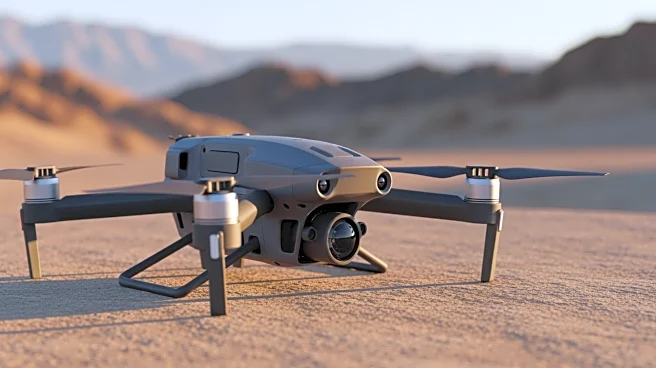What's Happening?
A Venezuelan naval vessel, the tank landing ship ARV Capana, has run aground near Cumarebo, approximately 175 miles northwest of Caracas. Bystander photos on social media indicate the ship is taking on water, settling lower than its Plimsoll mark suggests.
The incident occurred during a military exercise aimed at preparing for a potential American invasion. This is not the first time Venezuela has lost naval assets in routine operations, with previous incidents involving the Coast Guard patrol boat Naiguata and the vessel Warao. The grounding of Capana comes amid heightened tensions, as the Trump administration has deployed a significant task force of U.S. Navy warships, Air Force fighters, special forces, and Marines in the Caribbean to pressure the regime of Venezuelan dictator Nicolas Maduro. President Trump has confirmed secret CIA missions in Venezuela, and the Pentagon has authorized several attacks on suspected drug-smuggling boats off the Venezuelan coast.
Why It's Important?
The grounding of the ARV Capana highlights the vulnerabilities within the Venezuelan military, which is already under pressure from U.S. forces. The deployment of American military assets in the Caribbean signifies a strategic move to exert influence over the Maduro regime, potentially destabilizing the region further. The U.S. actions could lead to increased military confrontations, affecting regional security and international relations. The situation underscores the geopolitical tensions between the U.S. and Venezuela, with implications for global diplomacy and the balance of power in Latin America. The loss of naval assets further weakens Venezuela's defense capabilities, potentially impacting its ability to respond to external threats.
What's Next?
The Venezuelan military may need to reassess its naval operations and strategies to prevent further losses of valuable assets. The U.S. military presence in the Caribbean is likely to continue, maintaining pressure on the Maduro regime. Diplomatic efforts may be pursued to resolve tensions, but the risk of military escalation remains. The international community will be watching closely, as any significant developments could influence global political dynamics. Venezuela may seek support from allies to bolster its defense capabilities and counter U.S. influence.
Beyond the Headlines
The incident raises questions about the effectiveness and readiness of the Venezuelan military in the face of external threats. It also highlights the broader implications of U.S. intervention in Latin America, potentially setting a precedent for future engagements. The ethical considerations of military intervention and its impact on civilian populations are significant, as the region faces economic and humanitarian challenges. Long-term shifts in regional alliances and power structures could result from ongoing tensions.















